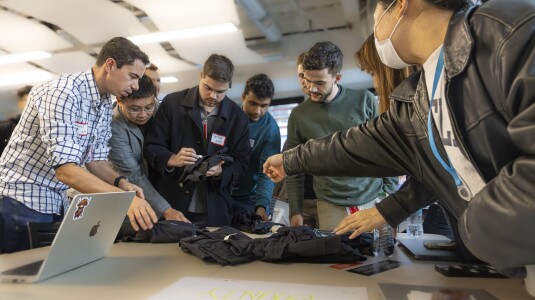In May of last year, Amazon and Carnegie Mellon University announced the first five Amazon graduate research fellows, marking an expansion of the company’s efforts to help amplify the work being done by master’s degree and PhD students. Now, the next round of fellows has been announced.
The program supports five graduate students engaged in scientific research in automated reasoning, computer vision, robotics, language technology, machine learning, operations research, and data science.
Fellows will also be invited to interview for a science internship at Amazon.
The five fellows are:
- Emily Black, computer science: Black, whose faculty advisor is Matt Fredrikson, associate professor of computer science, is a machine learning researcher specializing in the field of algorithmic fairness. Her research centers around understanding the impact of machine learning models in society. In particular, she focuses on showing novel ways in which commonly used machine learning models may act unfairly; finding ways to pinpoint when models are behaving in a harmful manner in practice; developing ways to mitigate harmful behavior when possible; and translating technical insights into technology policy recommendations.
- Saurabh Garg, machine learning: Garg’s faculty advisors are Zachary Lipton, assistant professor of operations research and machine learning and Sivaraman Balakrishnan, associate professor of statistics. Garg is interested in building robust and interpretable machine learning systems. Garg is researching the behavior of machine learning models in real-world scenarios and building provable methods to make progress toward relaxing simplifying assumptions in order to make robust and trustworthy models.
- Natalia Lombardi de Oliveria, data science and machine learning, whose faculty advisor is Ryan Tibshirani, professor of statistics and machine learning and an Amazon Scholar, is focused on estimating generalization. Also called optimism in classical statistics, it is the difference between the test and training performance of a predictive algorithm.
- Emre Yolcu, computer science: Yolcu’s faculty advisor is Marijn Heule, associate professor of computer science and an Amazon Scholar. Yolcu is interested in logic, in particular, proof complexity, satisfiability solving, and related topics. He has so far worked on the complexity of redundancy-based proof systems, a rewriting-based approach to the Collatz conjecture, and learning local search heuristics for satisfiability.
- Minji Yoon, computer science: Yoon, whose faculty advisor is Christos Faloutsos, Fredkin Professor of Computer Science and an Amazon Scholar, and Ruslan Salakhutdinov, professor of computer science, is working on deep graph learning. Yoon’s goal is to automate and democratize graph learning by borrowing the strong generalization power of deep learning. She first identifies the essential building blocks of a graph learning pipeline, applies automation to each block using various deep learning approaches, then glues the automated blocks back into one pipeline. Her final goal is to provide a plug-and-play end-to-end graph learning tool to users.







